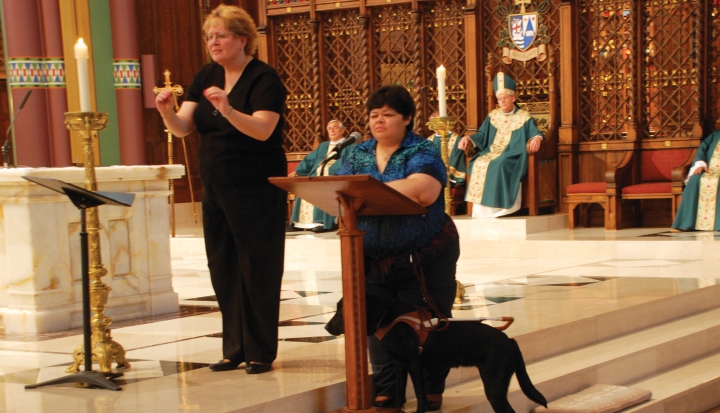Eight sets of young, eager eyes gaze up at Carol Ruddell. The Utah Sunday school teacher is about to dive into a lesson on the Eucharist. She clears her throat and, perhaps more important, reaches out her hands. Ruddell’s students are deaf. Her lesson is prepared in American Sign Language.
“It’s not your typical religious ed class,” Ruddell says. “And it’s a blast!”
Changing systems
Ruddell worked as an elementary school teacher for the deaf in Kansas, Texas, and Utah for over 22 years. Today she is a project director for Promise, a U.S. Department of Education project that supports teenagers with disabilities and their families. Ruddell coordinates case managers across six states, develops budgets, and researches policies to address disability needs.
“Disabilities are always multifaceted,” Ruddell explains. “There are state issues and then the individual side of someone with a disability trying to navigate systems that can be difficult.”
Ruddell uses her teaching background to walk families through the often complex world of government services and community supports.
“These great services we have often trap families in fear of losing something for their child. They’re afraid that if they earn $10 more, they’ll lose Medicaid,” Ruddell says. “Promise is about helping people understand the systems they are in and then helping them go to work and improve their own well-being.”
Ruddell’s passion for disability work can be traced back to her days at Girl Scout day camp. A desire to communicate with a scout who was deaf propelled Ruddell into sign language classes as a teenager. One question continues to drive her: How do we help and empower others?
“Taking care of your fellow person is important, whether at the individual or governmental level,” she says.
An inclusive church
In addition to work in the secular sphere, Ruddell is an active advocate for Catholics with disabilities. She sits on the board of the National Catholic Partnership on Disabilities (NCPD), an organization that works closely with U.S. bishops to foster greater participation of people with disabilities in church life.
“I take things one phone call at a time,” she says. “The reality is that the 10-year-old with autism whose mom wants him to make first communion is very different from the adult with mental illness who’s coming into the church and not being that quiet.”
The long hours are worth it. Students with disabilities are valuable members of the community, too, Ruddell says.
“A child with disabilities might have a lower attention span or have trouble reading, but what are you going to do, just skip them? How are they going to participate?” Ruddell asks. “It’s not about pulling kids out separately and teaching them. It’s about making this child feel a part of the body of Christ. Isn’t that what sacraments are about—a community celebration?”
Small organizations like the NCPD rely on volunteers to expand their national outreach. There are plenty of opportunities to get involved at the local level, too. Ruddell suggests talking with your pastor or parish staff to learn more about the needs of the community that might not be so obvious.
Ask: Do we have people with disabilities in our parish? How can I help? It’s about either being proactive in looking for opportunities to engage or saying yes when asked, she says. Ruddell invites pastors and people in the pews to be proactive in welcoming those with all different kinds of abilities. Strike up a conversation before Mass. Volunteer as a teacher’s aide. Yes, it might mean extra work. Yes, it might mean trying something new. Yes, it’s totally worth it.
“How do we help people go beyond what they’re comfortable with to something that could be more inclusive—and, quite frankly, more Catholic?” she asks.
Personal impact
Ruddell’s work with people who have disabilities feeds her own faith life.
“My faith grows when the people around me realize the body of Christ can be inclusive,” Ruddell explains. “Lordy, we’re all different—brown, white, disabled, gray-haired. How do we say the body of Christ is not homogenous and celebrate our differences?”
She continues, “The body of Christ is filled with imperfect people. That goes for all of us, not just people with disabilities. We’re all made in the image and likeness of God—and we all fall short. We all have disabilities and needs.”
This article also appears in the September 2016 issue of U.S. Catholic (Vol. 81, No. 9, pages 45–46).
Image: Courtesy of Intermountain Catholic newspaper















Add comment